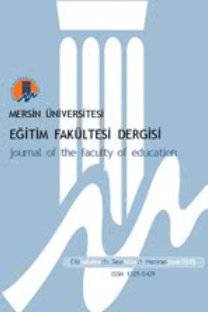Implementation of Technology Use Professional Development Strategies in an Elementary School in Ankara
Teknoloji entegrasyonu, sistemik değişim, profesyonel gelişim stratejileri, ilköğretim okulları.
Implementation of Technology Related Professional Development Strategies in an Elementary School in Ankara
Technology integration, systemic change, professional development strategies, elementary schools.,
___
- Aksit, N. (2007). Educational Reform in Turkey. International Journal of Educational Development, 27, 129-1
- Adiguzel, A. (2010). The status of instructional technology in the primary schools and classroom teachers’ level of using these technologies. Dicle University Ziya Gökalp Education Faculty Journal, 15, 1Albirini, A. (2006). Teachers' attitudes toward information and communication technologies: The case of Syrian EFL teachers. Computers and Education, 47(4), 373-398.
- Baker, A. J. L. (1997). Improving parent involvement programs and practice : A qualitative study of parent perceptions. School Community Journal, 7 (1), 127-153.
- Ertmer, P. A. (1999). Addressing first and second order barriers to change: Strategies for technology integration. Educational Technology Research and Development, 47(4), 47-61.
- Ertmer, P. A. (2005). Teacher pedagogical beliefs: The final frontier in our quest for technology integration? Educational Technology Research and Development, 53(4), 25-39.
- Eteokleous-Grigoriou, N. (2009). Installing a new learning, work and communication culture through systemically integrated technology in education. Systems Research and Behavioral Science, 26, 707-7
- Jenlink, P.M., Reigeluth, C.M., Carr, A.A., & Nelson, L.M. (1998). Guidelines for facilitating systemic change in school districts. Systems Research and Behavioral Science, 15 (3), 217-233
- Joseph, R., & Reigeluth, C.M. (2010). The systemic change process in education: A conceptual framework. Contemporary Educational Technology, 1(2), 97-117.
- Karaca, F. (2011). Teacher and student perceptions about technology use in an elementary school in Ankara. Journal of Social Studies Education Research, 2(2), 43-59.
- Karaca, F., Can, G., Yildirim, S. (2012). A path model for technology integration to elementary school settings in Turkey. Manuscript submitted for publication.
- Lee, I. ,& Reigeluth, C. M. (1994). Empowering teachers for new roles in a new educational system. Educational Technology, 34(1), 61-72.
- Marshall, C., & Rossman, G.B. (1999). Designing qualitative research (3 rd ed.). Thousand Oaks: Sage Publications.
- Menchaca, M., Bischoff, M., Dara-Abrams, B. (2003). A Model or Systemic Change Management in Education. Journal of Systemics, Cybernetics and Informatics, 2(1), 1-6.
- Nelson, L.M., & Reigeluth, C.M. (1995). Professional development in systemic educational change. In P.M. Jenlink (Ed.), Changing Education Systemically: Touchstones for Designing Future Schools. Palatine, IL: Skylight Publishing.
- Reigeluth, C., Annelli, J., & Otto, S. (1992). Technology and school restructuring. The Electronic School, A22-A
- Reigeluth C. M. (1993). Principles of Educational Systems Design. International Journal of Educational Research,9 (2), 117-131.
- Reigeluth, C. M. (1994). The imperative for systemic change. In C. M. Reigeluth & R. J. Garfinkle (Eds.), Systemic change in education (pp. 3-11). Englewood Cliffs, NJ: Educational Technology Publications.
- Reigeluth, C.M. & Joseph, R. (2002). Beyond technology integration: The case for technology transformation. Educational Technology, 42(4): 9–13.
- Sahin, S. (2011). An aspect on the school culture in Turkey and the United States. Asia Pacific Education Review, 12, 593-607.
- Toci, M., & Peck, K. L. (1998). A systems approach to improving technology use in education. Canadian Journal of Learning and Technology, 27(1), 19-30.
- Yildirim, S. (2007). Current utilization of ICT in Turkish basic education Schools: A review of teacher's ICT use and barriers to integration. International Journal of Instructional Media, 34(2) 171-186.
- Yayın Aralığı: 3
- Başlangıç: 2005
- Yayıncı: Mersin Üniversitesi Eğitim Fakültesi
Öğretmen Adaylarının Öğrenme Öğretme Süreci Alanındaki Yeterliklerine İlişkin Görüşleri
Gamze YAVUZ KONOKMAN, Tuğba YANPAR YELKEN
Erman UZUN, Ali YILDIRIM, M.yaşar ÖZDEN
Cem ÇUHADAR, Şemseddin GÜNDÜZ, Tayfun TANYERİ
KELİME SIKLIĞI AÇISINDAN TÜRK ATASÖZLERİ ÜZERİNE BİR DEĞERLENDİRME
